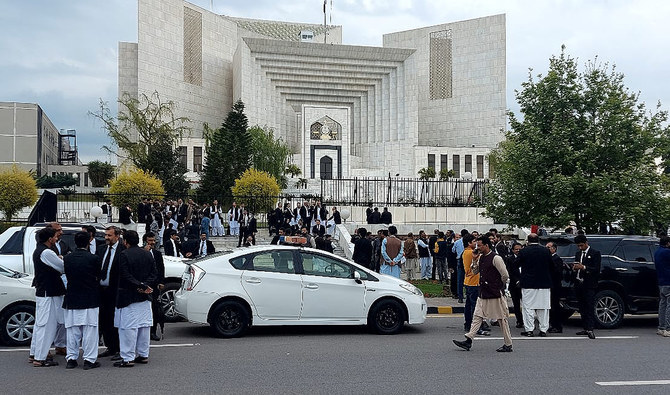ISLAMABAD: The Supreme Court (SC) of Pakistan on Monday adjourned hearing of a case pertaining to delay in the Punjab provincial assembly elections until June 1, local media reported, as the political stalemate in the South Asian country continues to linger.
The coalition government led by Prime Minister Shehbaz Sharif and the country’s top court have been at loggerheads since the latter took up cases of delays in elections in the Punjab and Khyber Pakhtunkhwa (KP) provinces, whose legislative assemblies were dissolved by ex-PM Imran Khan and allies in January to force the government to announce early national elections.
The government accuses the Supreme Court of being partial toward the ex-premier. The tiff spiraled into an ugly confrontation this month when Khan’s arrest in a graft case was ruled illegal by an SC bench headed by Chief Justice Umar Ata Bandial. The government and allies subsequently accused the top judge of bias and the Pakistan Democratic Alliance, an alliance of 13 political parties backing Sharif’s ruling party, staged a protest in front of the top court.
On Monday, a three-member bench, led by Chief Justice Bandial, resumed hearing the case relating to elections in Punjab, weeks after the top court ordered elections in Pakistan’s most populous province on May 14. At the outset of the hearing, Attorney General Mansoor Usman Awan said the recently passed Supreme Court (Review of Judgments and Orders) Act 2023 had changed the scope of the suo motu case and a review filed by the election regulator against the verdict.
“As per the new law, the scope of review and appeal are the same now,” Pakistan’s Dawn newspaper quoted Awan as telling the court, who contended that as per the law, the review could only be heard by a larger bench and raised objections to the three-judge panel hearing the case.
The Supreme Court (Review of Judgments and Orders) Act 2023, which was passed earlier this month, provides litigants the right to appeal in suo motu cases, extends the scope of review by forming a larger bench, besides increasing the “limitation period” for filing a review from 30 days to 60 days to protect the fundamental rights of the citizens under articles 10-A and 25 of the constitution.
The government maintains the legislation is aimed at facilitating and strengthening the Supreme Court in exercising its powers to review judgments and orders, but critics and the opposition see it as an attempt to reverse the disqualification of former premier Nawaz Sharif, elder brother of incumbent Pakistan PM Sharif, who was disqualified from holding a public office in 2017.
The top judge asked the attorney general if the other party in the case, Khan’s PTI, had been informed about the review of judgments law, to which Awan said PTI attorney Ali Zafar was on vacation, according to the Dawn report.
Chief Justice Bandial then adjourned the proceedings till Thursday, June 1, saying, “We understand that a new law has been passed … the PTI will also be made aware of it.”
The development comes amid a months-long political crisis in the South Asian country, with Khan demanding elections in Punjab and KP that account for more than half of Pakistan’s population.
The government maintains that it is not feasible for the country embroiled in an economic crisis to separately hold provincial elections. Pakista historically holds the provincial and national elections at the same time.
Multiple rounds of talks between Khan’s party and the government have taken place to finalize a consensus date for elections, but failed to yield any result.


















